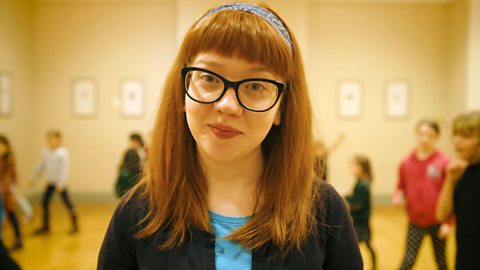Meet Megan, 24, from Northern Ireland, and find out more about her life as a drama facilitator. Part of our Bitesize world of work series.
Megan:
Hi, I'm Megan, I'm 24 years old, and I'm a drama facilitator. What I love about my job is that every day for me is different. Sometimes I'm doing drama workshops or I'm doing a storytelling session. It's my job to plan the classes and to teach them to the children and it's also my job to take part and make sure that they look like a lot of fun.
When I was seven years old, I was diagnosed with dyslexia and dyspraxia and I found primary school and secondary school very, very difficult. The lady who diagnosed me said to my mum, you must get her into a drama group because I think she would really love it. So my mum sent me off to a drama group and it was the best part of my week.
During my GCSEs I did better than I ever thought I could. After my GCSEs I went on to do a diploma in Acting. I got triple distinction stars and I was just completely blown away and I realised that this was how I was going to have to present my intelligence because this is how I can communicate it.
When I had finished college I applied to go to the University of Ulster. I achieved a 2:1 degree in Drama. So, after university, I considered becoming a teacher. As a dyslexic person, that seemed very scary to me so I went back to where I did my diploma to speak to one of my teachers and she said: "Oh, have you met my friend Lisa?" So I met Lisa and she told me all about her company Bright Young Things and their vision and how they want to affect the lives of children through drama, and here I am, a lead facilitator in her company and I'm absolutely delighted that I have my dream job.
I'm very proud of my work. I'm also very proud of Bright Young Things because children who come to our workshops get to realise their full potential through drama just like I did when I was growing up.
Children who come to our workshops get to realise their full potential through drama, just like I did when I was younger.
- Megan was diagnosed with dyslexia and dyspraxia when she was seven
- Dyslexia can cause problems with reading, writing and spelling. Dyspraxia (which is sometimes called developmental coordination disorder) affects coordination which can make many daily tasks more difficult
- Megan's teachers encouraged her mum to take her to a local drama school and she was amazed to find the skills she learnt there, such as speaking on stage, built her confidence and coordination
- As a drama facilitator for Bright Young Things, she leads classes for children in schools and arts centres across Northern Ireland.



Megan is a drama facilitator. Her role comes under the umbrella of a community arts worker. A community arts worker helps local communities plan and take part in activities like drama, dance, painting and photography.
What to expect if you want to be a community arts worker
- Community arts worker average salary: £19,000 to £29,000 per year
- Community arts worker typical working hours: 37 to 39 hours per week. You could work evenings, weekends, bank holidays and also attend events and appointments.
What qualifications do you need to be a community arts worker?
You could get into this role via a university course, a college course, an apprenticeship and volunteering.
Sources: LMI for All, National Careers Service
This information is a guide and is constantly changing. Please check the National Careers Service website for the latest information and all the qualifications needed.
For careers advice in all parts of the UK visit: National Careers Service (England), nidirect (Northern Ireland), My World of Work (Scotland) and Careers Wales (Wales).


Find out more
Work experience in your area
Find work experience placements with Workfinder.
Tips and advice
Help with interviews, writing a CV and all things work experience related.


How I turned my hobby into a career
Find out more about Megan's journey.

Gemma: school administrator. video
Gemma works in a primary school as a school administrator, under a business administration apprenticeship.

Outside activities can help put you a step ahead. video
Why transferring skills from outside activities helps.
